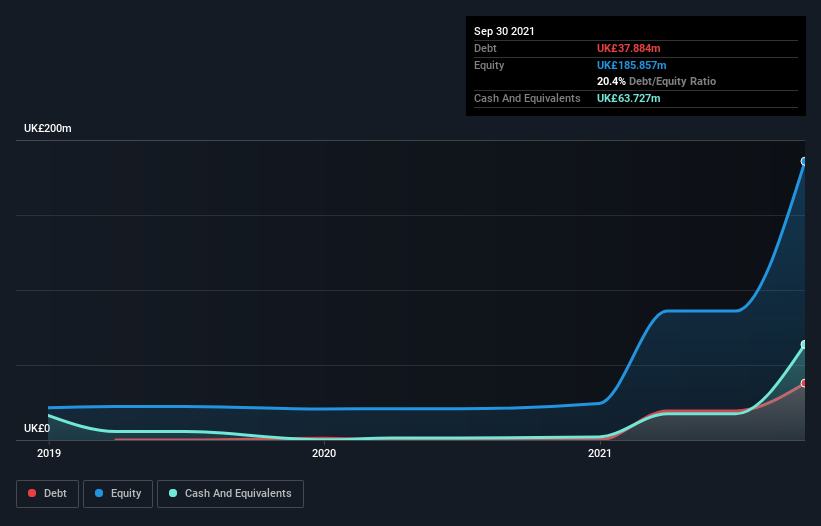
The external fund manager backed by Berkshire Hathaway's Charlie Munger, Li Lu, makes no bones about it when he says 'The biggest investment risk is not the volatility of prices, but whether you will suffer a permanent loss of capital.' When we think about how risky a company is, we always like to look at its use of debt, since debt overload can lead to ruin. Importantly, Argo Blockchain plc (LON:ARB) does carry debt. But the more important question is: how much risk is that debt creating?
Why Does Debt Bring Risk?
Generally speaking, debt only becomes a real problem when a company can't easily pay it off, either by raising capital or with its own cash flow. In the worst case scenario, a company can go bankrupt if it cannot pay its creditors. However, a more frequent (but still costly) occurrence is where a company must issue shares at bargain-basement prices, permanently diluting shareholders, just to shore up its balance sheet. By replacing dilution, though, debt can be an extremely good tool for businesses that need capital to invest in growth at high rates of return. When we examine debt levels, we first consider both cash and debt levels, together.
View our latest analysis for Argo Blockchain
What Is Argo Blockchain's Debt?
The image below, which you can click on for greater detail, shows that at September 2021 Argo Blockchain had debt of UK£37.9m, up from UK£286.8k in one year. However, its balance sheet shows it holds UK£63.7m in cash, so it actually has UK£25.8m net cash.

A Look At Argo Blockchain's Liabilities
We can see from the most recent balance sheet that Argo Blockchain had liabilities of UK£65.1m falling due within a year, and liabilities of UK£6.31m due beyond that. Offsetting this, it had UK£63.7m in cash and UK£1.96m in receivables that were due within 12 months. So it has liabilities totalling UK£5.77m more than its cash and near-term receivables, combined.
This state of affairs indicates that Argo Blockchain's balance sheet looks quite solid, as its total liabilities are just about equal to its liquid assets. So while it's hard to imagine that the UK£625.9m company is struggling for cash, we still think it's worth monitoring its balance sheet. While it does have liabilities worth noting, Argo Blockchain also has more cash than debt, so we're pretty confident it can manage its debt safely.
It was also good to see that despite losing money on the EBIT line last year, Argo Blockchain turned things around in the last 12 months, delivering and EBIT of UK£33m. The balance sheet is clearly the area to focus on when you are analysing debt. But ultimately the future profitability of the business will decide if Argo Blockchain can strengthen its balance sheet over time. So if you want to see what the professionals think, you might find this free report on analyst profit forecasts to be interesting.
Finally, a business needs free cash flow to pay off debt; accounting profits just don't cut it. Argo Blockchain may have net cash on the balance sheet, but it is still interesting to look at how well the business converts its earnings before interest and tax (EBIT) to free cash flow, because that will influence both its need for, and its capacity to manage debt. During the last year, Argo Blockchain burned a lot of cash. While investors are no doubt expecting a reversal of that situation in due course, it clearly does mean its use of debt is more risky.
Summing up
While it is always sensible to look at a company's total liabilities, it is very reassuring that Argo Blockchain has UK£25.8m in net cash. So we are not troubled with Argo Blockchain's debt use. The balance sheet is clearly the area to focus on when you are analysing debt. However, not all investment risk resides within the balance sheet - far from it. These risks can be hard to spot. Every company has them, and we've spotted 3 warning signs for Argo Blockchain (of which 2 are potentially serious!) you should know about.
At the end of the day, it's often better to focus on companies that are free from net debt. You can access our special list of such companies (all with a track record of profit growth). It's free.
New: Manage All Your Stock Portfolios in One Place
We've created the ultimate portfolio companion for stock investors, and it's free.
• Connect an unlimited number of Portfolios and see your total in one currency
• Be alerted to new Warning Signs or Risks via email or mobile
• Track the Fair Value of your stocks
This article by Simply Wall St is general in nature. We provide commentary based on historical data and analyst forecasts only using an unbiased methodology and our articles are not intended to be financial advice. It does not constitute a recommendation to buy or sell any stock, and does not take account of your objectives, or your financial situation. We aim to bring you long-term focused analysis driven by fundamental data. Note that our analysis may not factor in the latest price-sensitive company announcements or qualitative material. Simply Wall St has no position in any stocks mentioned.
Have feedback on this article? Concerned about the content? Get in touch with us directly. Alternatively, email editorial-team (at) simplywallst.com.
About LSE:ARB
Argo Blockchain
Engages in the bitcoin and other cryptocurrencies mining activities.
Moderate and slightly overvalued.
Similar Companies
Market Insights
Community Narratives



